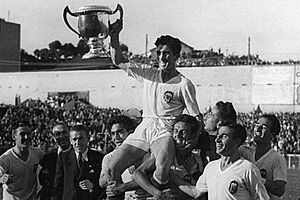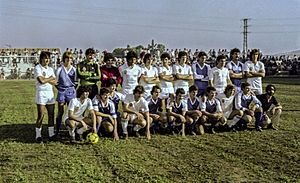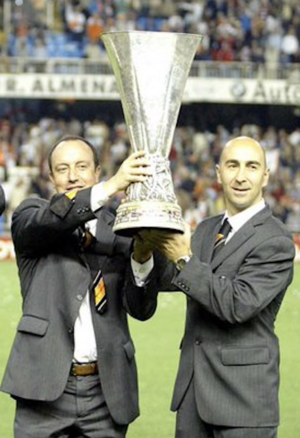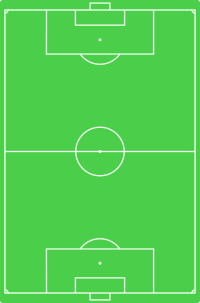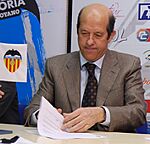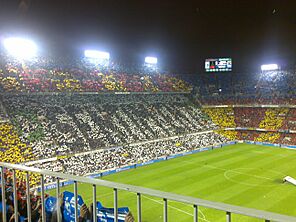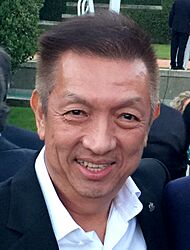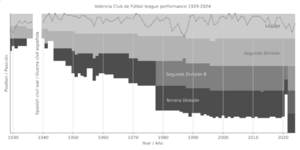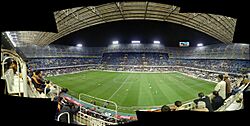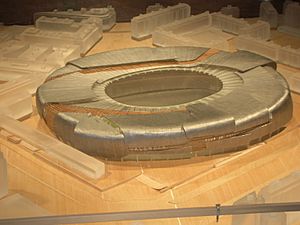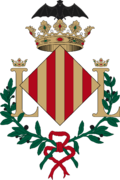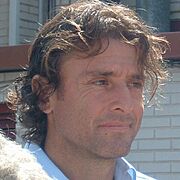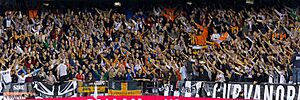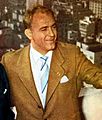Valencia CF facts for kids
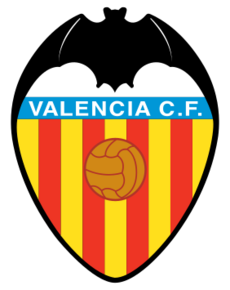 |
|||
| Full name | Valencia Club de Fútbol, S.A.D. | ||
|---|---|---|---|
| Nickname(s) | Ches Blanquinegros (The Black and Whites) Murciélagos (The Bats) Valencianistas (Supporters) |
||
| Short name | Valencia, VCF, VAL | ||
| Founded | 18 March 1919 (as Valencia Foot-ball Club) | ||
| Ground | Mestalla | ||
| Capacity | 49,430 | ||
| Owner | Peter Lim | ||
| President | Kiat Lim | ||
| Head coach | Carlos Corberán | ||
| League | La Liga | ||
| 2022–23 | La Liga, 16th of 20 | ||
|
|
|||
Valencia Club de Fútbol, S. A. D. is a professional football club from Valencia, Spain. People often call it Valencia CF or just Valencia. The team plays in La Liga, which is the top football league in Spain. Valencia was started in 1919. Since 1923, their home games have been played at the Mestalla, which can hold 49,430 fans.
Valencia has won many important trophies. They have won six La Liga titles and eight Copa del Rey titles. They also won the Supercopa de España once. In European competitions, they have won two Inter-Cities Fairs Cups, one UEFA Cup, and one UEFA Cup Winners' Cup. They also have two UEFA Super Cups and one UEFA Intertoto Cup. Valencia even reached the final of the UEFA Champions League two years in a row, in 2000 and 2001. In 2004, the IFFHS (International Federation of Football History & Statistics) named Valencia the World’s Best Club.
Many famous players have been part of Valencia CF. Five former club members are in the FIFA International Football Hall of Fame. These include Alfredo Di Stéfano, Mario Alberto Kempes, Romário, Jorge Valdano, and Didier Deschamps. Valencia has also had players who won major individual awards. They have the most Zarra Trophy winners (5) and are high in the rankings for the Zamora Trophy (9) and Pichichi Trophy (6).
Several Valencia players helped the Spanish national team win the 2010 FIFA World Cup. These players were David Villa, Carlos Marchena, David Silva, and Juan Mata. David Villa was the second-highest scorer in that tournament. Seven Valencia players have also won Olympic medals.
Valencia is known for its excellent youth academy, called "Acadèmia". This academy has produced many world-class players. Some famous players who came from their academy include Miguel Tendillo, Ricardo Arias, Fernando Gómez, Andrés Palop, Javier Farinos, Raúl Albiol, David Albelda, Vicente Rodríguez, Gaizka Mendieta, and David Silva. More recently, stars like Isco, Jordi Alba, Paco Alcácer, Juan Bernat, José Gayà, Carlos Soler, Ferran Torres, and Lee Kang-in also came from Valencia's academy.
Valencia used to be one of the biggest clubs in the world by number of fans. They had about 50,000 season ticket holders at their best. However, the club faced challenges starting in the mid-2010s. Singaporean billionaire Peter Lim bought the team in 2014.
Contents
- Club History
- Rise to Spanish Football Success in the 1940s
- European Triumphs in the 1960s
- Domestic and European Glory from the 1970s to Early 1980s
- Challenges and Relegation in the Mid-to-Late 1980s
- Return to Prominence in the 1990s
- Valencia's Golden Era: Early 2000s
- Financial Challenges and Stability (2010–2014)
- Decline Under Peter Lim's Ownership (2014–Present)
- Home Stadium: Mestalla
- Club Identity
- Team Players
- Coaching Staff
- Notable Coaches
- Player Records
- Seasons Played
- Club Honours
- Valencia CF in International Football
- The Academy: Valencia CF Training Centre
- Motorsports Involvement
- Esports Involvement
- Images for kids
- See also
Club History
Valencia CF was officially started on March 18, 1919. Octavio Augusto Milego Díaz became its first president after a coin toss. The team played its first official game on May 21, 1919, against Valencia Gimnástico, losing 1–0.
Valencia moved to the Mestalla Stadium in 1923. Before that, they played at the Algirós ground. The first game at Mestalla was a 0–0 draw against Castellón Castalia. The next day, Valencia won 1–0 against the same team. In 1923, Valencia CF won the Regional Championship. This allowed them to play in the national Copa del Rey cup for the first time.
Rise to Spanish Football Success in the 1940s
The Spanish Civil War stopped Valencia's progress for a while. But in 1941, they won the Copa del Rey, beating RCD Espanyol in the final. In the 1941–42 season, the club won its first La Liga championship. At that time, winning the Copa del Rey was considered more important than the league title. Valencia won the league again in the 1943–44 and 1946–47 seasons. They finished the 1940s by winning the 1949 Copa del Rey. This meant Valencia ended the decade with three La Liga titles and two Copa del Rey titles. This success made the club a major name in Spanish football.
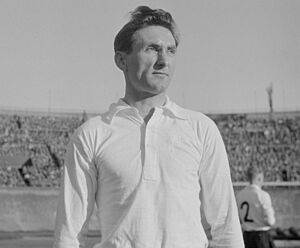
In the 1950s, Valencia did not win as many titles as before, but the club still grew. The Mestalla stadium was made bigger, holding 45,000 fans. The team had many talented Spanish and foreign players. These included Spanish international Antonio Puchades and Dutch forward Faas Wilkes. In the 1952–53 season, Valencia finished second in La Liga. The next season, they won the Copa del Rey, which was then called the Copa del Generalísimo.
European Triumphs in the 1960s
In the early 1960s, Valencia had average league results. However, they achieved their first European success by winning the Inter-Cities Fairs Cup. This competition was the start of what is now the UEFA Cup. Valencia beat Barcelona in the final of the 1961–62 tournament. In the next year's tournament, Valencia played against Croatian club Dinamo Zagreb in the final and won again. Valencia reached the Inter-Cities Fairs Cup final for a third time in a row in the following season. But this time, they lost 2–1 to another Spanish club, Zaragoza.
Domestic and European Glory from the 1970s to Early 1980s
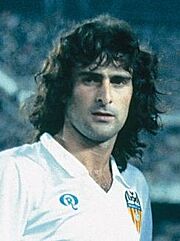
Alfredo Di Stéfano, a famous former player, became Valencia's coach in 1970. He quickly led the club to their fourth La Liga championship, their first since 1947. This win meant Valencia qualified for the important European Cup for the first time. In the 1971–72 competition, Valencia reached the third round but lost to Hungarian champions Újpesti Dózsa. In 1972, the club also finished second in both La Liga and the domestic cup.
Key players in the 1970s included Austrian midfielder Kurt Jara, Dutch forward Johnny Rep, and Argentinian forward Mario Kempes. Kempes was the top scorer in La Liga in 1976–77 and 1977–78. Valencia won the Copa del Rey again in the 1978–79 season. The next season, they won the European Cup Winners' Cup by beating English club Arsenal in the final. They also won the European Super Cup against Nottingham Forest. Kempes was a key player in their European success.
Challenges and Relegation in the Mid-to-Late 1980s
In 1982, Miljan Miljanić became coach. After a difficult season, Valencia was near the relegation zone with seven games left. Koldo Aguirre took over as coach, and Valencia just managed to avoid relegation. In the 1983–84 and 1984–85 seasons, the club was in serious debt. Players and staff were not getting paid, and morale was low. The club finally faced relegation at the end of the 1985–86 season. This was the first time Valencia had been relegated in 55 years of top-flight Spanish football.
Arturo Tuzón became the new club president and helped Valencia return to La Liga. Alfredo Di Stéfano came back as coach in 1986, and Valencia won promotion after the 1986–87 season. Di Stéfano stayed until the 1987–88 season, when the team finished 14th. Bulgarian forward Luboslav Penev joined in 1989. In the 1988–89 La Liga season, Valencia finished third, showing they were becoming competitive again.
Return to Prominence in the 1990s
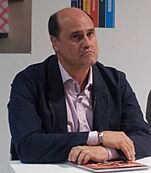
In the 1989–90 La Liga season, Valencia finished second behind Real Madrid. This earned them a spot in the UEFA Cup.
Guus Hiddink became head coach in the 1991–92 season. The club finished fourth in the league and reached the quarter-finals of the Copa del Rey. In 1992, Valencia became a Sporting Limited Company. Hiddink remained coach until 1993.
Brazilian coach Carlos Alberto Parreira, who had just won the 1994 FIFA World Cup with the Brazil national team, became manager in 1994. Parreira signed Spanish goalkeeper Andoni Zubizarreta, Russian forward Oleg Salenko, and Predrag Mijatović. However, the team did not perform as expected, and he was replaced by José Manuel Rielo. The club continued to struggle for success, even with top coaches like Luis Aragonés and Jorge Valdano. They also had foreign star forwards like Brazilian Romário, Claudio López, Argentinian Ariel Ortega, and Romanian Adrian Ilie. In the 1995–96 La Liga season, Valencia finished second to Atlético Madrid after a close race for the title.
Valencia had two difficult seasons after that. But the 1998–99 La Liga season marked the start of one of the club's most successful periods. They won their first trophy in 19 years, the 1998–99 Copa del Rey, under Claudio Ranieri. This also qualified them for the UEFA Champions League.
Valencia's Golden Era: Early 2000s
Valencia started the 1999–2000 season by winning the Spanish Super Cup against Barcelona. Valencia finished third in the league. Their biggest success was reaching the European Cup final for the first time. However, in the final in Paris on May 24, 2000, Real Madrid beat Valencia 3–0.
After this, Claudio López left for Lazio, and other key players also departed. New players like John Carew, Rubén Baraja, Roberto Ayala, Vicente Rodríguez, and Fábio Aurélio joined. Pablo Aimar also arrived in the winter. Baraja, Aimar, Vicente, and Ayala became crucial players during Valencia's strong period in the early 2000s.
Valencia started the next season well, leading the league after ten games. But playing in the demanding Champions League took its toll. Héctor Cúper's team reached the final for the second year in a row. In the final against Bayern Munich in Milan, Gaizka Mendieta scored an early penalty for Valencia. Bayern equalized with another penalty. After extra time, the game went to a penalty shootout. A miss by Mauricio Pellegrino meant Bayern won, and Valencia lost their second straight final. Valencia then finished fifth in La Liga, missing out on Champions League qualification for the next season. In their final league match, they needed a draw against Barcelona but lost 3-2, with Rivaldo scoring a last-minute hat-trick.
Club president D. Pedro Cortés resigned in July, having overseen a successful period. D. Jaime Ortí replaced him. Rafael Benítez became the new coach, replacing Héctor Cúper. Key players like Gaizka Mendieta and Didier Deschamps left, while Carlos Marchena, Mista, Curro Torres, Francisco Rufete, Gonzalo de los Santos, and Salva Ballesta joined.
From 1999 to the end of the 2004 season, Valencia had one of its most successful periods. They won two La Liga titles, a UEFA Cup, a Copa del Rey, and a UEFA Super Cup. They also reached two Champions League finals.
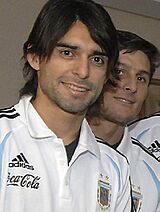
A big win against Real Madrid early in the season was important. This was followed by a club record of eleven wins in a row. After a loss to Deportivo in December 2001, Valencia was 2–0 down at half-time against Espanyol but came back to win 3–2.
In the second half of the season, Benítez's team had a small setback with a 1–0 loss to Real Madrid. But they recovered with four wins and two draws in the next six games.
In a crucial game against Espanyol, Valencia was losing 1–0 at half-time and had a player sent off. But Rubén Baraja scored two goals in the second half, leading to a 2–1 comeback win. Real Madrid's loss to Real Sociedad gave Valencia a three-point lead.
Valencia's final game of the season was on May 5, 2002, against Málaga. Goals from Roberto Ayala and Fábio Aurélio secured Valencia their fifth La Liga title. This was 31 years after their last league win.
The 2002–03 season was disappointing. Valencia failed to defend their La Liga title, finishing fifth. They also lost in the Champions League quarter-finals to Inter Milan. The 2003–04 season saw Valencia behind Real Madrid for a long time. In February, Madrid was eight points ahead. However, Madrid's form dropped, and Valencia overtook them to win the title, their second in three seasons. The club also won the UEFA Cup, beating Marseille 2–0 in the final.
In summer 2004, coach Benítez left Valencia due to problems with the club president. He joined Liverpool. Former Valencia coach Claudio Ranieri replaced him. Despite winning the European Super Cup against Porto, Ranieri's second time as coach was not successful. Valencia was in seventh place by February and was knocked out of the Champions League group stage. Ranieri was fired in February. Valencia finished the 2004–05 season outside of the UEFA Cup spots.
In summer 2005, Getafe coach Quique Flores became Valencia's new manager. He led the team to third place, earning a spot in the Champions League. The 2006–07 season was difficult due to many player injuries and arguments between Flores and sporting director Amedeo Carboni. Valencia finished fourth and lost to Chelsea in the Champions League quarter-finals. In summer 2007, Carboni was replaced by Ángel Ruiz.
On October 29, 2007, the Valencia board fired Flores after poor results. Óscar Fernández took over temporarily. A day later, Ronald Koeman became the new manager. However, Koeman's time did not improve things. Valencia dropped to 15th place, just two points above the relegation zone. Despite poor league form, Valencia won the Copa del Rey on April 16, 2008, beating Getafe 3–1. This was the club's seventh Copa title. Five days later, Koeman was fired after a 5–1 league defeat. Voro became caretaker manager and guided Valencia away from relegation, finishing tenth.
Unai Emery became the new head coach on May 22, 2008. The team started well, winning four of their first five games and reaching the top of La Liga. However, Valencia then had a poor run in the league, dropping to seventh place. Reports emerged of a huge club debt of over 400 million euros, and players were not being paid. The team was also knocked out of the UEFA Cup. After a period of only five points from ten league games, the club secured a loan to cover player expenses. This helped improve their form, and they won six of their next eight games, moving back into the fourth-place Champions League spot. However, they finished sixth after losing to Atlético Madrid and Villarreal, missing Champions League qualification for a second season.
Financial Challenges and Stability (2010–2014)
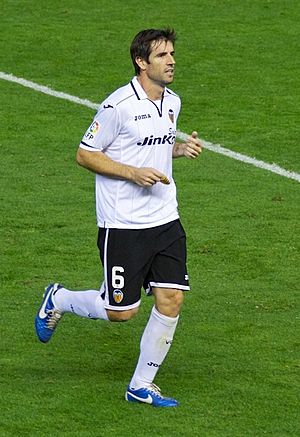
Valencia still faced massive debt. Rumors suggested that top players like David Villa, Juan Mata, and David Silva might leave to help the club's finances. In the 2009–10 season, Valencia returned to the Champions League by finishing third in La Liga. However, in summer 2010, David Villa and David Silva were sold to Barcelona and Manchester City to reduce the debt. Despite losing these key players, the team finished third again in the 2010–11 La Liga season. They were knocked out of the Champions League by Schalke 04 in the round of 16. In summer 2011, captain Juan Mata was sold to Chelsea to further help Valencia's financial situation. Club president Manuel Llorente announced that the debt had decreased and that work on the new stadium would restart soon.
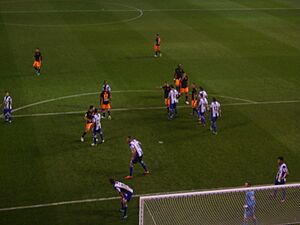
During the 2012–13 season, Ernesto Valverde became the new manager. But after failing to qualify for the Champions League, he stepped down. Miroslav Đukić replaced him. On July 5, 2013, Amadeo Salvo was named the new club president. On August 1, Valencia sold star striker Roberto Soldado to English club Tottenham Hotspur for €30 million. Đukić was fired six months into the 2013–14 season after a very poor start. Juan Antonio Pizzi replaced him on December 26, 2013. Under Pizzi, Valencia reached the semi-finals of the UEFA Europa League, losing to Sevilla. They finished eighth in La Liga despite their difficult start.
Decline Under Peter Lim's Ownership (2014–Present)
In May 2014, Singaporean businessman Peter Lim was chosen to buy 70.4% of the club's shares. After months of talks, an agreement was reached in August 2014. Juan Antonio Pizzi was unexpectedly fired and replaced by Nuno Espírito Santo on July 2, 2014. Later, Salvo said that hiring Nuno was a condition Lim had for buying the club. This raised questions because of Nuno's close link to football agent Jorge Mendes, who was also friends and business partners with Lim. However, Nuno's first season was successful. New players included Álvaro Negredo, André Gomes, and Enzo Pérez. Valencia finished the 2014–15 season in fourth place, qualifying for the Champions League.
On July 2, 2015, Amadeo Salvo resigned as executive president. He was popular with fans. On August 10, 2015, Nicolás Otamendi was sold to Manchester City for £32 million, and Aymen Abdennour was signed from Monaco for £22 million. Valencia beat Monaco in the Champions League play-off round. However, Valencia had a poor start to the 2015–16 league season, winning only five of thirteen matches and failing to get past the Champions League group stage. Fans were also worried about Jorge Mendes's growing influence. On November 29, Nuno resigned, and former Manchester United player Gary Neville was hired on December 2. Valencia went nine games without a win before getting their first victory under Neville. On March 30, 2016, Neville was fired after winning only three of sixteen league games. Pako Ayestarán, who Neville had brought in as assistant, replaced him. Valencia finished the season in twelfth place.
In summer 2016, André Gomes and Paco Alcácer were sold to Barcelona, and Shkodran Mustafi was sold to Arsenal. Ezequiel Garay and Nani joined the club. Pako Ayestarán was fired on September 21, 2016, after four straight losses at the start of the 2016–17 season. Former Italy national team coach Cesare Prandelli was hired on September 28. But he resigned after just three months, saying the club had made false promises about transfers. Days later, on January 7, 2017, sporting director Jesús García Pitarch also resigned. Voro was named caretaker manager for the fifth time. Valencia was in 17th place and in danger of relegation. However, results improved under Voro, and Valencia finished 12th. On March 27, Mateu Alemany became the new director general.
The club also announced that president Lay Hoon Chan had resigned and would be replaced by Anil Murthy. After rumors that Lim might sell the club, Murthy assured fans that Valencia was a long-term project for him and Lim. For the next season, former Villarreal coach Marcelino became the new manager on May 12.
Marcelino's first season was successful. The club finished fourth in La Liga and returned to the Champions League. In Marcelino's second season, Valencia again finished fourth and reached the semi-finals of the UEFA Europa League. On May 25, 2019, Valencia won the Copa del Rey, their first trophy since 2008. They beat league winners Barcelona 2–1 in the final.
Both Marcelino and sporting director Mateu Alemany, who were key to this success, were fired on September 11, 2019. Marcelino had publicly criticized Lim. Albert Celades replaced him but was later fired due to poor results. Sporting director César Sánchez also resigned that season. By 2020, the club had six different managers and six different sporting directors under Lim's ownership.
For the 2020–21 season, Javi Gracia was hired as manager. He was in charge of a team with many young players and reserves. The club did not sign any new players but sold key ones, like captain Dani Parejo. Local talent Ferran Torres was also sold to Manchester City for a price considered half his market value. Overall, Valencia sold players worth 85 million euros to balance the club's finances. At the start of the season, the club could not pay player salaries. After six seasons under Peter Lim's ownership, Valencia had lost 323 million euros. In recent years, the quality of the playing squad has decreased significantly, and Lim's ownership has faced strong criticism.
In the 2021–22 season, José Bordalás became head coach. Valencia reached the Copa del Rey final in Bordalás's first season but lost to Real Betis on penalties after a 1–1 draw.
In June 2022, Anil Murthy left. Peter Lim's sons became club directors, and Lay Hoon Chan returned as club President.
Home Stadium: Mestalla
Valencia played its first few years at the Algirós stadium. But in 1923, they moved to the Mestalla. In the 1950s, Mestalla was rebuilt, increasing its capacity to 45,000 fans. Today, it has 49,430 seats, making it the fifth-largest stadium in Spain. It is also known for its steep stands and for having a very exciting atmosphere during games.
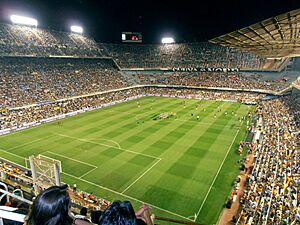
On May 20, 1923, the Mestalla pitch was officially opened with a friendly match between Valencia and Levante UD.
Mestalla has a long history. When it first opened, it could hold 17,000 fans. The club started to show its strength in regional championships, leading to the first changes to Mestalla in 1927. The stadium's capacity grew to 25,000. However, it was badly damaged during the Spanish Civil War. It was used as a camp and a storage area, with most of its stands destroyed. After being rebuilt, Mestalla was the stadium where Valencia won its first title in 1941.
In the 1950s, the Valencia ground changed the most. It became a stadium with 45,500 seats. In October 1957, a flood from the Turia River damaged it. But Mestalla recovered and even added more improvements, like artificial lights, which were first used in 1959.
In the 1960s, the stadium looked the same, but the area around it changed quickly. Mestalla also hosted its first European matches. Nottingham Forest was the first foreign team to play there, on September 15, 1961.
From 1969, the phrase "Anem a Mestalla" ("Let's go to the Mestalla") started to be used less. This was because there was a plan to rename the stadium after Luis Casanova Giner, the club's most successful president. However, Giner asked in 1994 for the original name, Mestalla, to remain.
In 1972, the club's main office, located behind the stands, was opened. It had a modern design and a trophy room. In summer 1973, more seats were added, removing standing areas to make it more comfortable. The club also thought about moving Mestalla to a new location outside the city but decided against it.
Mestalla also hosted the Spain national football team for the first time in 1925. It was chosen as a venue for the 1982 FIFA World Cup when Spain hosted the tournament. It also hosted games during the 1992 Summer Olympics in Barcelona. All of Spain's matches up to the final were held at Mestalla, and they won the gold medal. Mestalla has hosted many important international matches and Cup finals. It has also been a temporary home for other clubs like Castellón and Real Madrid during their stadium renovations.
Future Stadium: Nou Mestalla
The 2008–09 season was supposed to be the last at Mestalla. The club planned to move to their new 75,000-seat stadium, Nou Mestalla, for the 2009–10 season. However, due to the club's financial problems, construction on the new stadium was greatly delayed. Construction for Nou Mestalla resumed and is expected to be finished before the 2027–28 season.
Club Identity
Team Kit
Valencia's original kit was white shirts, black shorts, and black socks. Over the years, these colors have often switched between white and black. The away kit has been orange in recent years. Third kits have used colors from the club crest, such as yellow, blood orange, and blue.
| From 1980 to present | ||
|---|---|---|
| Period | Kit manufacturer | Shirt sponsor |
| 1980–1982 | Adidas | None |
| 1982–1985 | Ressy | |
| 1985–1990 | Rasan | Caja Ahorros Valencia |
| 1990–1992 | Puma | |
| 1992–1993 | Mediterránia | |
| 1993–1994 | Luanvi | |
| 1994–1995 | Cip | |
| 1995–1998 | Ford | |
| 1998–2000 | Terra Mítica | |
| 2000–2001 | Nike | |
| 2001–2002 | Metrored | |
| 2002–2003 | Terra Mítica | |
| 2003–2008 | Toyota / Panasonic Toyota Racing | |
| 2008–2009 | Valencia Experience | |
| 2009–2011 | Kappa | Unibet |
| 2011–2014 | Joma | Jinko Solar |
| 2014–2016 | Adidas | beIN Sports |
| 2016–2017 | ||
| 2017–2019 | BLU Products | |
| 2019–2020 | Puma | bwin |
| 2021–2022 | SOCIOS.com | |
| 2022–2023 | Cazoo | |
| 2023–present | TM Real Estate Group | |
The team has also had smaller, local sponsors over the years, like Lamiplast, a furniture company from Valencia.
Club Anthem
To celebrate the club's 75th anniversary, president Arturo Tuzón asked Pablo Sánchez Torella to create an anthem for the club. This was a pasodoble (a type of Spanish music) with lyrics written by Ramón Gimeno Gil in the Valencian language. The anthem was first performed on the club's anniversary, September 21, 1993.
Club Crest
Valencia and the Balearic Islands were taken over by King James I of Aragon in the 1200s. After this, the King made them independent kingdoms, with him as their ruler. The Valencia crest shows the arms of King James I.
The special crowned letters "L" next to the shield were given by Peter IV. These letters mean that the city was loyal to the King twice. So, there are two "L"s and a crown for the king.
There are a few ideas about why a bat is on the crest. One idea is that bats are very common in the area. Another story says that on October 9, 1238, when King James I was about to enter the city, a bat landed on his flag. He saw this as a good sign. After his victory, the bat was added to the coat of arms.
In May 2013, there were reports that DC Comics had concerns about the club's new bat logo. They felt it looked too much like Batman's symbol. The club stated they wanted to use a new bat logo for casual clothes and applied for permission. DC Comics filed an objection, and the club dropped the application. DC Comics later filed another complaint about Valencia's logo for its centennial (100-year anniversary), saying it could be confused with Batman's symbol.
Team Players
Current Squad
|
|
Reserve Team
|
|
Players Returning from Loan
|
|
Players Out on Loan
|
Coaching Staff
| Current technical staff | |||||||||||||||||
|---|---|---|---|---|---|---|---|---|---|---|---|---|---|---|---|---|---|
| Position | Staff | ||||||||||||||||
| Technical director | |||||||||||||||||
| Head coach | |||||||||||||||||
| Assistant head coach | |||||||||||||||||
| Field assistant coach | |||||||||||||||||
| Goalkeeping coach | |||||||||||||||||
| Team Manager | |||||||||||||||||
| Fitness coach | |||||||||||||||||
| Analyst | |||||||||||||||||
| Assistant fitness coach | |||||||||||||||||
| Assistant goalkeeping coach | |||||||||||||||||
| Chief of medical services | |||||||||||||||||
| Delegate | |||||||||||||||||
| Chief of kit man | |||||||||||||||||
Last updated: 28 December 2024
Source: Valencia CF
Notable Coaches
| Coaches who have won at least one major trophy with Valencia | ||||||||||||||
|---|---|---|---|---|---|---|---|---|---|---|---|---|---|---|
| Name | Period | Total | ||||||||||||
| Domestic | International | |||||||||||||
| LL | CdR | SC | UCL | UCWC | UEL | UIC | USC | |||||||
| 1939–42 | 2 | 1 | 1 | - | - | - | - | - | – | |||||
| 1943–46 | 1 | 1 | - | - | - | - | - | - | – | |||||
| 1946–48 | 1 | 1 | - | - | - | - | - | - | – | |||||
| 1948–54 | 3 | - | 2 | 1 | - | - | - | - | – | |||||
| 1960–62 | 1 | - | - | - | - | - | 1 | - | – | |||||
| 1962–63 | 1 | - | - | - | - | - | 1 | - | – | |||||
| 1966–68 | 1 | - | 1 | - | - | - | - | - | – | |||||
| 1970–74, 1979–80, 1986–88 | 2 | 1 | - | - | - | 1 | - | - | – | |||||
| 1979, 1980–82 | 2 | - | 1 | - | - | - | - | - | 1 | |||||
| 1997–99, 2004–05 | 3 | - | 1 | - | - | - | - | 1 | 1 | |||||
| 1999–01 | 1 | - | - | 1 | - | - | - | - | – | |||||
| 2001–04 | 3 | 2 | - | - | - | - | 1 | - | – | |||||
| 2007–08 | 1 | - | 1 | - | - | - | - | - | – | |||||
| 2017–19 | 1 | - | 1 | - | - | - | - | - | – | |||||
| Total | 1919– | 23 | 6 | 8 | 2 | 0 | 1 | 3 | 1 | 2 | ||||
LL. = La Liga; CdR = Copa del Rey; SC = Supercopa de España; UCL = UEFA Champions League; UCWC = UEFA Cup Winners' Cup; UEL = UEFA Europa League; UIC = UEFA Intertoto Cup; USC = UEFA Super Cup
Player Records
| Rank | Player | Nationality | Apps | Years |
|---|---|---|---|---|
| 1 | Fernando | 556 | 1983–1998 | |
| 2 | Ricardo Arias | 521 | 1976–1992 | |
| 3 | David Albelda | 485 | 1995–2013 | |
| 4 | Miguel Ángel Angulo | 434 | 1996–2009 | |
| 5 | Manuel Mestre | 424 | 1956–1969 | |
| 6 | Santiago Cañizares | 416 | 1998–2008 | |
| 7 | Enrique Saura | 400 | 1975–1985 | |
| 8 | Dani Parejo | 383 | 2011–2020 | |
| 9 | José Gayá | 376 | 2012–present | |
| 10 | José Claramunt | 375 | 1966–1978 |
| Rank | Player | Nationality | Goals | Years |
|---|---|---|---|---|
| 1 | Mundo |
238 |
1939–1950 | |
| 2 | Waldo Machado | 160 | 1961–1970 | |
| 3 | Mario Kempes | 149 | 1976–1981 1982–1984 |
|
| 4 | Fernando | 143 | 1983–1998 | |
| 5 | David Villa | 130 | 2005–2010 | |
| 6 | Silvestre Igoa | 117 | 1941–1950 | |
| 7 | Manuel Badenes | 102 | 1950–1956 | |
| 8 | Vicente Seguí | 91 | 1946–1959 | |
| 9 | Luboslav Penev | 88 | 1989–1995 | |
| 10 | Epi Fernández | 87 | 1940–1949 |
Player Transfers
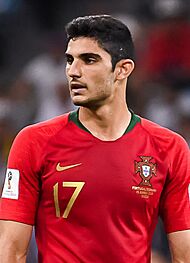
| Record transfer fees paid by Valencia | ||||||||||||||
|---|---|---|---|---|---|---|---|---|---|---|---|---|---|---|
| Rank | Player | Fee (€) | Paid to | Date | ||||||||||
| 1 | 40,000,000 | 2018 | ||||||||||||
| 2 | 35,000,000 | 2019 | ||||||||||||
| 3 | 30,000,000 | 2015 | ||||||||||||
| 4 | 28,000,000 | 2014 | ||||||||||||
| 5 | 25,000,000 | 2006 | ||||||||||||
| 2015 | ||||||||||||||
| 2018 | ||||||||||||||
| 8 | 24,000,000 | 2001 | ||||||||||||
| 9 | 22,000,000 | 2015 | ||||||||||||
| 10 | 20,000,000 | 2016 | ||||||||||||
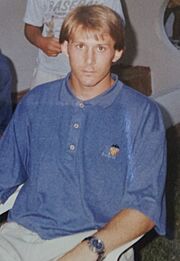
| Record transfer fees received by Valencia | ||||||||||||||
|---|---|---|---|---|---|---|---|---|---|---|---|---|---|---|
| Pos. | Player | Fee (€) | Received from | Date | ||||||||||
| 1 | 48,000,000 | 2001 | ||||||||||||
| 2 | 45,000,000 | 2015 | ||||||||||||
| 3 | 41,500,000 | 2022 | ||||||||||||
| 4 | 41,000,000 | 2016 | ||||||||||||
| 5 | 40,400,000 | 2018 | ||||||||||||
| 6 | 40,000,000 | 2010 | ||||||||||||
| 7 | 35,000,000 | 2016 | ||||||||||||
| 8 | 33,000,000 | 2010 | ||||||||||||
| 9 | 32,000,000 | 2000 | ||||||||||||
| 10 | 30,000,000 | 2016 | ||||||||||||
| 2013 | ||||||||||||||
Seasons Played
- 90 seasons in La Liga (top league)
- 4 seasons in Segunda División (second league)
Club Honours
| Type | Competition | Titles | Seasons |
|---|---|---|---|
| Domestic | La Liga | 6 | 1941–42, 1943–44, 1946–47, 1970–71, 2001–02, 2003–04 |
| Segunda División | 2 | 1930–31, 1986–87 | |
| Copa del Rey | 8 | 1941, 1948–49, 1954, 1966–67, 1978–79, 1998–99, 2007–08, 2018–19 | |
| Supercopa de España | 1 | 1999 | |
| Copa Eva Duarte | 1 | 1949 | |
| Continental | European Cup Winners' Cup | 1 | 1979–80 |
| UEFA Cup | 1 | 2003–04 | |
| European Super Cup/UEFA Super Cup | 2 | 1980, 2004 | |
| Inter-Cities Fairs Cup | 2 | 1961–62, 1962–63 | |
| UEFA Intertoto Cup | 1 | 1998 | |
| Regional | Levante Championship / Valencian Championship | 10 | 1922–23, 1924–25, 1925–26, 1926–27, 1930–31, 1931–32, 1932–33, 1933–34, 1936–37, 1939–40 |
Awards and Recognitions
- IFFHS The World's Club Team of the Year: 2004
Valencia CF in International Football
| Season-by-season record in international competitions | |||||||||||||||||||
|---|---|---|---|---|---|---|---|---|---|---|---|---|---|---|---|---|---|---|---|
| 1 Group stage. Highest-ranked eliminated team in case of qualification, lowest-ranked qualified team in case of elimination. | |||||||||||||||||||
| Intercontinental Cup / FIFA Club World Cup | |||||||||||||||||||
| Season | Quarterfinals | Semifinals | Final / 3rd pos. | ||||||||||||||||
| UEFA Super Cup | |||||||||||||||||||
| Season | Final | ||||||||||||||||||
| 1979–80 | |||||||||||||||||||
| 2003–04 | |||||||||||||||||||
| European Cup / UEFA Champions League | |||||||||||||||||||
| Season | Preliminary stages | Round of 32 | Round of 16 | Quarterfinals | Semifinals | Final | |||||||||||||
| 1971–72 | |||||||||||||||||||
| 1999-00 | |||||||||||||||||||
| 2000–01 | |||||||||||||||||||
| 2002–03 | |||||||||||||||||||
| 2004–05 | |||||||||||||||||||
| 2006–07 | |||||||||||||||||||
| 2007–08 | |||||||||||||||||||
| 2010–11 | |||||||||||||||||||
| 2011–12 | |||||||||||||||||||
| 2012–13 | |||||||||||||||||||
| 2015–16 | |||||||||||||||||||
| 2018–19 | |||||||||||||||||||
| 2019–20 | |||||||||||||||||||
| UEFA Cup Winners' Cup | |||||||||||||||||||
| Season | Preliminary stages | Round of 32 | Round of 16 | Quarter-finals | Semi-finals | Final | |||||||||||||
| 1967–68 | |||||||||||||||||||
| 1979–80 | |||||||||||||||||||
| 1980–81 | |||||||||||||||||||
| Inter-Cities Fairs Cup / UEFA Cup / UEFA Europa League | |||||||||||||||||||
| Season | Preliminary stages | Round of 32 | Round of 16 | Quarterfinals | Semifinals | Final | |||||||||||||
| 1961–62 | |||||||||||||||||||
| 1962–63 | |||||||||||||||||||
| 1963–64 | |||||||||||||||||||
| 1964–65 | |||||||||||||||||||
| 1965–66 | |||||||||||||||||||
| 1966–67 | |||||||||||||||||||
| 1968–69 | |||||||||||||||||||
| 1969–70 | |||||||||||||||||||
| 1970–71 | |||||||||||||||||||
| 1972–73 | |||||||||||||||||||
| 1978–79 | |||||||||||||||||||
| 1981–82 | |||||||||||||||||||
| 1982–83 | |||||||||||||||||||
| 1989–90 | |||||||||||||||||||
| 1990–91 | |||||||||||||||||||
| 1992–93 | |||||||||||||||||||
| 1993–94 | |||||||||||||||||||
| 1996–97 | |||||||||||||||||||
| 1998–99 | |||||||||||||||||||
| 2001–02 | |||||||||||||||||||
| 2003–04 | |||||||||||||||||||
| 2004–05 | |||||||||||||||||||
| 2008–09 | |||||||||||||||||||
| 2009–10 | |||||||||||||||||||
| 2011–12 | |||||||||||||||||||
| 2013–14 | |||||||||||||||||||
| 2015–16 | |||||||||||||||||||
| 2018–19 | |||||||||||||||||||
| UEFA Intertoto Cup | |||||||||||||||||||
| Season | Round of 32 | Round of 16 | Quarter-finals | Semi-finals | Finals | ||||||||||||||
| 1998–99 | |||||||||||||||||||
| 2005–06 | |||||||||||||||||||
The Academy: Valencia CF Training Centre
Since May 2009, Valencia CF has had a special training center called "The Academy." This is the first training center of its kind for a football club in Spain.
The Academy offers university-level education, classroom training, and online courses related to sports and football.
Valencia CF is one of the few clubs in Spain that offers an MBA (Master of Business Administration) in International Sport Management. They currently do this with Valencia Catholic University Saint Vincent Martyr.
For Valencia CF's 90th anniversary, the academy started the first university course that studied the history of a football club. Valencia CF is the first football club in Spain to be studied in college.
Motorsports Involvement
Valencia CF has also been involved in motorsports like Formula One, Super GT, MotoGP, Moto2, Moto3, and Formula Nippon. From 2003 to 2008, Valencia CF was an official partner of Panasonic Toyota Racing. This was to celebrate Toyota being their shirt sponsor. Valencia CF also sponsored all Toyota-engined Formula Nippon teams and Toyota Super GT teams. In 2009, Valencia CF became a partner of the 250cc team Stop And Go Racing Team. In 2014, they partnered with Aspar Team in MotoGP, Moto2, and Moto3 races.
Esports Involvement
In June 2016, Valencia CF started an esports division. They have teams in games like Hearthstone, Rocket League, and League of Legends. They joined other football clubs like Beşiktaş and PSG in having League of Legends teams. On July 13, they announced their League of Legends team, which mostly included Spanish players.
In November 2020, Valencia CF eSports launched a team for Arena of Valor in Thailand. The team has six Thai players and competes in the RoV Pro League. They joined local club Buriram United FC and French club Paris Saint-Germain FC in having AoV teams.
Images for kids
-
Alfredo Di Stéfano had three successful periods as coach of the club.
-
Claudio Ranieri coached Valencia on two occasions with mixed success.
-
Héctor Cúper's time as coach saw the club become important again in European football.
-
Rafael Benítez, Valencia's most successful coach, won two league titles and one UEFA Cup in three years.
See also
 In Spanish: Valencia Club de Fútbol para niños
In Spanish: Valencia Club de Fútbol para niños


